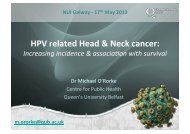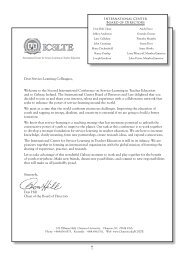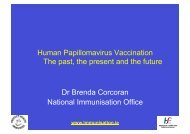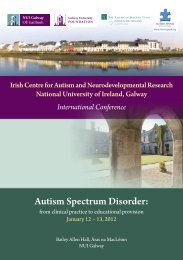Welcome to Galway Dr. Bob Kennedy Conference ... - Conference.ie
Welcome to Galway Dr. Bob Kennedy Conference ... - Conference.ie
Welcome to Galway Dr. Bob Kennedy Conference ... - Conference.ie
Create successful ePaper yourself
Turn your PDF publications into a flip-book with our unique Google optimized e-Paper software.
Theme: Biodiversity and Ecosystem FunctionDeposition on a biogenic reef and the impact of increased seawatertemperatureFlora E. A. Kent 1 , William G. Sanderson 1 , Kim Last 21School of Life Sc<strong>ie</strong>nces, Heriot-Watt University, Edinburgh, UK2Scottish Association for Marine Sc<strong>ie</strong>nce, Oban, Argyll, UKEmail: fk76@hw.ac.ukBiogenic reefs, such as those formed by horse mussels (Modiolus modiolus)are biodiversity hotspots, and therefore recognized for their conservationimportance. M. modiolus habitats are defined as “reefs” in Marine ProtectedAreas under the EU Habitats Directive, and are a Priority Marine Feature forconservation in Scotland. Highlighting and quantifying the services providedby different marine ecosystems shows the value of different habitats andspec<strong>ie</strong>s <strong>to</strong> soc<strong>ie</strong>ty, which can support decision making and marine spatialplanning. The objectives of this study were <strong>to</strong> measure sedimentationin situ and then <strong>to</strong> test if M. modiolus biodeposition rates (faeces andpseudofaeces) were modif<strong>ie</strong>d by an increase in temperature. A method wasdeveloped <strong>to</strong> collect sediment and biodeposits on a M. modiolus reef usingportable experimental units that were deployed by SCUBA divers. Controlsunits accounted for background sediment deposition using dead musselsshells held <strong>to</strong>gether as proxy for living reef matrix. In the labora<strong>to</strong>ry, VortexResuspension Tanks (VoRTs) were used <strong>to</strong> maintain M. modiolus undercontrolled conditions where the seawater temperature could be adjusted andwhere the natural feeding environment was otherwise simulated. Five VoRTswere maintained at 13°C and five at 15°C. Measurements of biodepositionin the f<strong>ie</strong>ld show that live M. modiolus produce 41.2 ± 12.2 mg mussel-1day-1. However, when exposed <strong>to</strong> a 2°C increase in temperature, depositionfell significantly. The results provide the first evidence of the scale at whichM. modiolus are able <strong>to</strong> provide ecosystem services, such as water filtrationand sediment sequestration in the North East Atlantic. Increased seawatertemperature can modify the function of M. modiolus, the effects of which maybe increased as a consequence of future seawater warming.- 40 -









